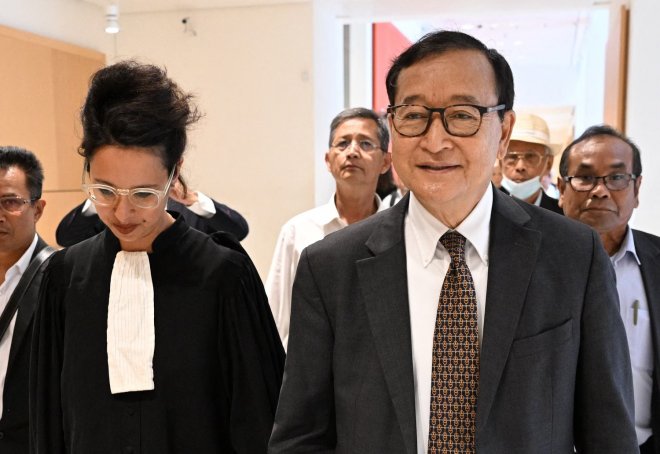
Local commune councilors affiliated with Cambodia’s main opposition Candlelight Party on Tuesday walked out of a meeting where they were asked to publicly condemn Hun Sen’s exiled political rival Sam Rainsy, the party told Radio Free Asia.
Commune chiefs from Hun Sen’s ruling Cambodian People’s Party, or CPP, summoned several of the Candlelight Party’s commune councilors from Kandal province and demanded they sign and add their thumbprints to a petition which said they denounce the opposition figure.
Sam Rainsy is a co-founder of the Cambodia National Rescue Party, which was the previous main opposition party before the country’s Supreme Court dissolved it in 2017. He has been living in self-exile in France since 2015, when he fled a series of charges his supporters say are politically motivated.
Hun Sen, who has ruled Cambodia since 1985, threatened last month that he would dissolve any party that associates with Sam Rainsy and accused those who support him of being against Cambodia’s king.
The Candlelight party then attempted to distance itself from Sam Rainsy by condemning those who insult the king, without naming any specific person.
This statement should have been enough to ease any and all concerns, the Candlelight Party’s Kong Narith, the second deputy chief from Takhmao city’s Doeum Mean commune in Kandal province, told RFA’s Khmer Service.
Kong Narith said that he has maintained his position and has acted in accordance with the law, especially in respecting the will of the voters who elected him and others in the party.
Long Seng Bun, the first deputy of Takhmao’s Prek Hoor commune, said that forcing him and other members of Candlelight to sign these types of petitions is illegal and a violation of political rights, and that is why he refused.
“I told them that I won’t do anything against the law,” he said. “The voters voted for me so I will serve my constituencies.”
Commune councilors from the Candlelight Party have been pressured by their colleagues from the CPP four separate times to denounce Sam Rainsy not only in Takhmao, but also several other Kandal province districts, sources said.
The CPP officials threatened the opposition party commune councilors, saying that if they don"t do what they are told, they will be punished according to law.
Illegal coercion
Candlelight’s vice president Thach Setha told RFA that any coercive, threatening or persuasive action by the ruling party officials is a serious illegal act. He said that his party’s statement against those who are against the king has already been accepted by Hun Sen, so there is no reason for the CPP officials to continue to intimidate the Candlelight members of commune councils.
He urged the Ministry of Interior to take action against anyone who engages in coercive activities against Candlelight party members.
“We are representatives from a legitimate party and have already issued a letter of condemnation,” he said. “Why are they not recognizing that?”
RFA was unable to contact the Interior Ministry’s spokesman Khieu Sopheak or Kandal province governor Kong Sophorn for comment as of Tuesday.
Anyone who refuses to sign the petition that condemns Sam Rainsy is a traitor and has ties with the exiled political figure, the ruling party’s spokesperson Sok Ey San said.
Social development researcher Seng Sary said that the local ruling party officials are acting beyond their superiors" orders. He added that local officials should recognize the decisions and orders of their superiors without exacerbating the political situation.
“I believe that the political situation in Cambodia can"t be resolved by law, so it is necessary to resolve it through political negotiations,” Seng Sary said. "And more importantly, easing the political heat in this situation is one way to resolve it."
The Candlelight Party, which has more than 2,000 commune council seats across the country last week issued a letter calling on authorities to stop acts of political intimidation and coercion.
Their statement said that these actions violate Cambodia’s constitution and the people’s civil rights, political rights, and their rights to freedom of expression.
Translated by Samean Yun. Written in English by Eugene Whong.
